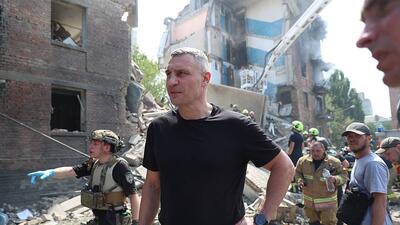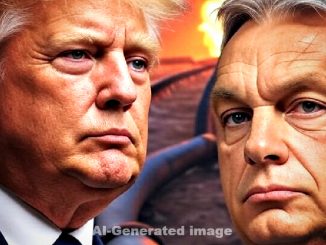
| Published June 3, 2025
Kyiv Mayor Vitali Klitschko has publicly accused President Volodymyr Zelensky of authoritarianism, alleging that wartime measures are being used to centralize power and suppress democratic institutions. Klitschko claims that the imposition of martial law and the appointment of a military administration in Kyiv have undermined local governance, leading to raids and fabricated criminal cases against city officials.
“This is a purge of democratic principles and institutions under the guise of war,” Klitschko declared, adding “I once said that it smells of authoritarianism in our country. Now it stinks of it.”
🇷🇺🇺🇦 Mayor of Kyiv Vitali Klitschko has publically criticized President Zelensky, essentially calling him a dictator and accusing him and his government of turning Ukraine into an authoritarian state. pic.twitter.com/FzqTcGWmsh
— Heyman_101 (@SU_57R) June 1, 2025
The Times describes Zelensky and Klitschko as being in a “de facto state of war.”
The report notes that the Ukrainian government has arrested seven Kiev city officials as part of ongoing investigations targeting an alleged criminal network involved in corruption cases related to urban development.
Our strength is not just about muscles – it starts in the mind and the heart.#FaceTheChallenge #Willpower pic.twitter.com/DMyBMKVWxP
— Klitschko (@Klitschko) May 30, 2025
The National Anti-Corruption Bureau of Ukraine (NABU) has arrested several of Klitschko’s subordinates as part of “Operation Clean City,” targeting corruption within the Kyiv City Council. While Zelensky’s administration asserts that these measures are necessary during wartime to ensure proper use of funds, critics argue that they erode democratic principles.
This conflict highlights the tension between maintaining national security and preserving democratic institutions during times of crisis. As Ukraine continues to navigate the challenges of war, the balance between centralized authority and local governance remains a critical issue.
Here are the key implications of Kyiv Mayor Vitali Klitschko publicly accusing President Volodymyr Zelensky of authoritarianism:
🏛️ 1. Erosion of Democratic Norms During Wartime
Centralized Power: Klitschko’s remarks suggest Ukraine’s wartime governance is drifting toward over-centralization, sidelining local authorities and concentrating authority in the executive branch.
Risk of Democratic Backsliding: Though war often justifies emergency powers, prolonged use without institutional checks may lead to long-term damage to Ukraine’s democratic framework.
—
⚔️ 2. Political Fractures Amid a War Effort
Divided Leadership: Public disputes between top Ukrainian leaders—especially during an existential war—signal internal fractures that could erode public confidence and international perceptions of unity.
Klitschko as Opposition Voice: Klitschko is positioning himself as a credible domestic counterbalance to Zelensky, possibly foreshadowing political challenges or even a future presidential bid.
—
🌍 3. Reputational Risk on the Global Stage
Western Support Under Pressure: Allegations of authoritarian behavior may weaken international backing, especially among Western democracies that have supported Ukraine both militarily and financially under the assumption of shared democratic values.
Narrative Ammo for Russia: The Kremlin could exploit Klitschko’s criticisms to undermine Zelensky’s legitimacy and paint Ukraine as internally unstable or hypocritical.
—
🧩 4. Strain on Governance and Local Autonomy
Suppression of Local Voices: Klitschko’s complaint that local governance is being bypassed indicates a breakdown in federal-local coordination, which could impact city-level services, logistics, and crisis response in key areas like Kyiv.
Reduced Institutional Resilience: Weakening municipal power and sidelining dissent risks leaving Ukraine with less flexible and adaptive governance during and after the war.
🧭 Overall Takeaway:
Kyiv Mayor Vitali Klitschko’s sharp criticism of President Zelensky—calling Ukraine’s leadership “authoritarian”—reveals a deeper crack in Ukraine’s wartime unity and raises serious questions about the future of its democracy.
While Zelensky has been globally praised for his leadership against Russia, Klitschko’s remarks suggest that wartime powers may be overstretched, undermining local governance and silencing dissent in the name of national security.
Bottom line:
Ukraine’s internal tensions—between defending the country and preserving democratic norms—are growing harder to ignore. Klitschko’s warning is a reminder: winning the war is one battle; protecting democracy is another.
SOURCES: ZEROHEDGE – Ukraine “Stinks Of Authoritarianism” – Kiev Mayor Klitschko Hits Out At Zelensky
UKRAINSKA PRAVDA – Kyiv mayor accuses Zelenskyy of authoritarianism amid corruption scandal
THE UK SUN – GLOVES OFF Boxer turned Mayor of Kyiv Vitali Klitschko lands major blow as he blasts ‘authoritarian’ Zelensky





Be the first to comment